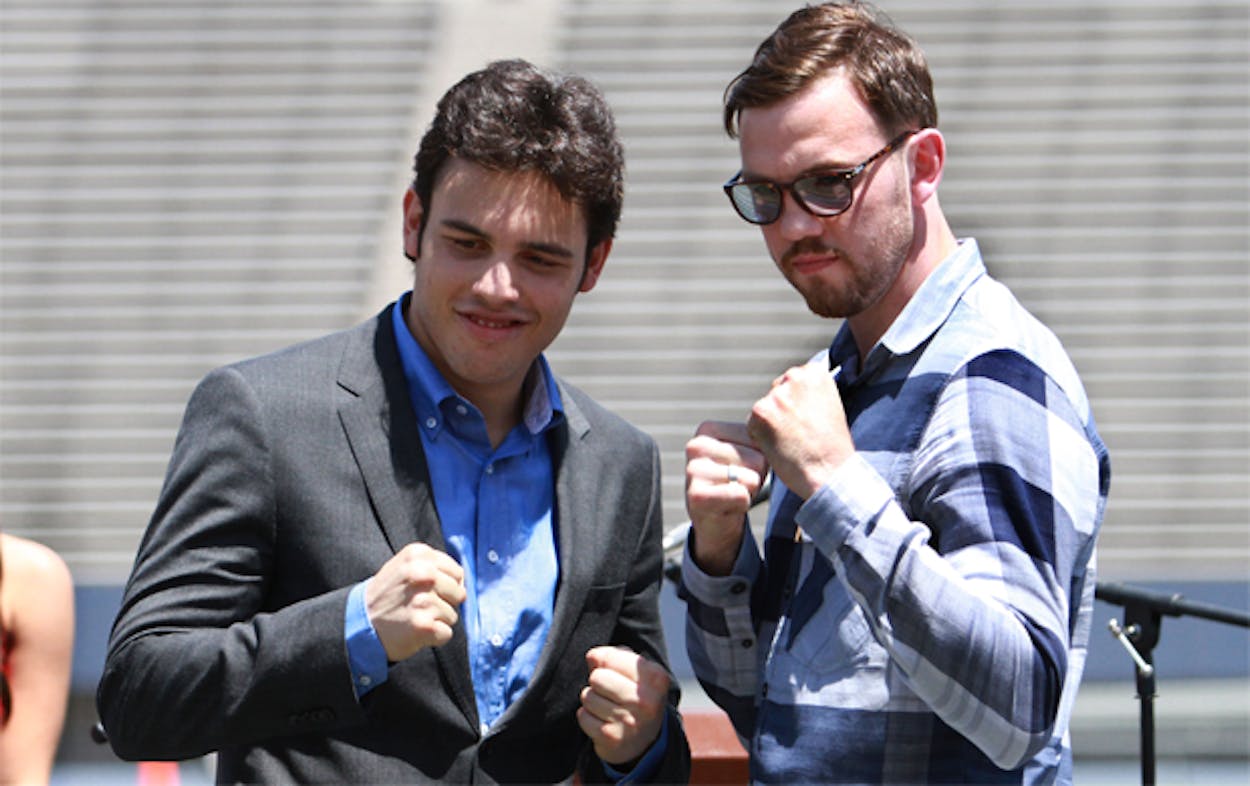When it comes to selling tickets, sponsorships, and pay-per-view, boxing is only slightly more restrained than professional wrestling. So in that sense, last week’s press conference for the Julio Cesar Chavez Jr.-Andy Lee fight at the Sun Bowl June 16 delivered all the hype and then some.
Promoter Bob Arum introduced the fighters, who gave photographers the obligatory pose (above). But the big announcement was there wouldn’t be a fight: Arum revealed that University of Texas system chancellor Francisco Cigarroa had deemed the event a “higher than normal” security risk, and therefore it could not take place on the campus of the University of Texas at El Paso.
That certainly got the city talking about the fight, with Arum crying racism (against Mexican boxing fans) and seemingly every elected official in the El Paso area—including Mayor John Cook, state senator Jose Rodriguez, and congressman Silvestre Reyes—demanding that the chancellor reconsider. The outcry was not just about the fight (and its accompanying economic impact), but the perception of El Paso and the safety of the Texas border.
Now the fight’s back on, with some conditions.
As Bill Knight of the El Paso Times wrote, the reversal came in response to all the pressure, following a video conference between UT’s director of police, Michael Heidingsfield, El Paso law enforcement, and El Paso representatives of the FBI, DEA, ICE, and Customs and Border Patrol.
In a video statement Cigarroa, who is a Laredo native, showed just how sensitive he was to all the blowback on this issue. During the seven-minute clip, Cigarroa talks about “my love for the city of El Paso” before explaining his original decision and then outlining his reconsideration:
The controversy has inevitably been politicized. In its unsigned editorial celebrating the reversal, the El Paso Times wrote:
Yes, there is ongoing narco violence in Juárez.
But it has not spilled over the border. Much data back that up. Thus, we cringe when others in high places do not understand that fact.
When Cigarroa nixed the Sun Bowl as a venue, we felt another unjust slap.
First, Gov. Rick Perry told a national audience that a narco-war-related bomb had been detonated in Downtown El Paso.
That did not happen.
Then Texas Agriculture Commissioner Todd Staples said the border is a “war zone.”
That is untrue, too.
“This decision really gave a lot of visibility to those who would classify us as dangerous, and we’ve had to combat that all along,” UTEP president Diana Natalicio had told the Texas Tribune‘s Reeve Hamilton. “We’ve spent a lot of time trying to burnish the image a little bit to enable us to recruit everything from student athletes to researchers.”
But as both Hamilton and the Times‘ Daniel Borunda wrote, there did turn out to be a bit of smoke to all the narco violence paranoia fire, not connected to El Paso, but rather, to Chavez Jr.
As even Mayor Cook acknowledged, the boxer’s girlfriend is reportedly the former common-law wife of Edgard Guzman, the deceased son of purported Sinaloa cartel kingpin Joaquin “Chapo” Guzman. Chavez Jr.’s hometown, Culiacan, is the seat of the Sinaloa cartel, which has been engaged in a violent, years-long war with the Juárez cartel.
But Borunda reported that a Homeland Security assessment of the fight “did not find any specific threat to the boxing match at Sun Bowl Stadium and did not make a recommendation as to whether the event should proceed.”
The conditions Cigarroa outlined for the fight involve the development of a security plan, the promoters (rather than UTEP or the UT system) covering additional security costs, and Natalicio writing “a letter to the UTEP community” about the event (“students and non-essential personnel should feel free to leave the University premises while the event is ongoing,” the statement said, a less-than-ringing endorsement).
But the big one is a ban on alcoholic beverages at the fight, a standard prohibition at NCAA championship events on campus, but not otherwise. As the Times‘ Knight pointed out, alcohol was sold at the April 19 boxing match at the Don Haskins Center on UTEP’s campus, as well as the April 27 fight card at the Frank Erwin Center on the University of Texas at Austin campus.
“Ironically,” Knight also noted, “the first event to allow alcohol sales on University of Texas system facilities was the Oscar De La Hoya-Patrick Charpentier fight on June 13, 1998 — in the Sun Bowl.”
If the security concern is truly Mexican cartel violence, it seems doubtful beer will make a difference–drunk sports fans are drunk sports fans, whether they are from El Paso, other Texas cities, or from across the border.
UTEP, the promoters, and senator Rodriguez still hope to overturn the booze ban, since it could affect a sponsorship deal with Tecate, as well as the attendance.
“Absolutely, it would affect ticket sales if you do not sell alcohol,” Brian Kennedy of the El Paso Sports commission told Knight. “Of course, it depends on the event. For example, Disney on Ice wouldn’t be a big deal. But for most things, people want the entire experience. They want to enjoy the event and have an adult beverage.”







